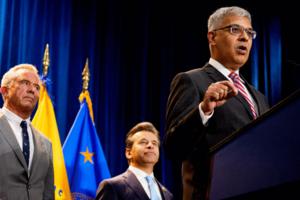Current News
/ArcaMax

NASA takes possession of Orion for Artemis II moon mission
For the first time since Apollo 17 in 1972, NASA officially has its hands on a spacecraft expected to fly humans to the moon.
Lockheed Martin, prime contractor for the Orion space capsule, transferred possession of the Artemis II spacecraft Thursday to the agency’s Exploration Ground Systems team base at Kennedy Space Center.
Artemis II is ...Read more

Connecticut lawmakers move to give minors access to contraception without parental notice
HARTFORD, Conn. — The state House of Representatives in Connecticut voted overwhelmingly Thursday night to codify into state law that minors can consent to contraception without parental notification.
After a lengthy debate, the House voted 117 – 27 as four Democrats joined with 23 Republicans against the measure.
The issue of parental ...Read more

RFK Jr. said his agency will find the cause of autism. These researchers have actually been looking
The annual meeting of the International Society for Autism Research took place in Seattle this week.
The field's premiere scientific conference was scheduled to be held in the Emerald City five years ago, until COVID-19 dashed those plans. This time, U.S. autism researchers face a very different kind of crisis: massive cuts to federal funding, ...Read more

Israel strikes Damascus after plea for help from Druze minority
Israel struck a target near the presidential palace in the Syrian capital after the Druze community in both countries called for help following a series of violent clashes between the minority group and Syrian government forces.
The Israel Defense Forces said in a post on Telegram on Friday that its fighter jets hit an area close to the People�...Read more

Trump administration designates Haiti's powerful armed gangs as foreign, global terrorists
The Trump administration has designated a coalition of powerful Haitian gangs and an allied force sowing terror in Haiti’s bread basket as terrorists.
The Viv Ansanm coalition, whose membership consists of more than two dozen of Haiti’s best-armed criminal groups, and the Gran Grief gang have been labeled as both Foreign Terrorist ...Read more

Fear and anxiety reign as burglary soars in post-fire Altadena: 'Trauma on top of the trauma'
LOS ANGELES — When the smoke of the Eaton fire cleared, residents whose homes were left standing believed they had escaped disaster.
But many are finding that blessing comes with a curse. They are now prime targets for opportunistic thieves who prowl their neighborhoods at night.
Jenna and Howard Morris’ home has been burglarized three ...Read more

Michigan lawmakers seeking billions of dollars for nearly 800 pet projects
LANSING, Mich. — Michigan lawmakers made nearly 800 requests totaling an estimated $4 billion to fund pet projects for communities and not-for-profit organizations across the state through a new, fully public earmark request process implemented after years of backroom dealmaking that concealed the names of lawmakers seeking earmarks.
The ...Read more

Minnesota legislators consider rolling back or revising some laws passed by DFL in 2023
MINNEAPOLIS — Minnesota legislators are debating whether to roll back or revise some signature laws passed by Democrats two years ago as they race to reach a budget deal in the final weeks of their session.
The proposed policy pullbacks have opened a glaring partisan divide in the tied Minnesota House, imperiling budget negotiations. ...Read more

Sex assaults make up almost half of discredited Colorado Bureau of Investigation scientist's mishandled cases
DENVER — Sex assault cases made up almost half of the more than 1,000 cases mishandled by a discredited Colorado Bureau of Investigation scientist over her nearly three-decade career, the agency confirmed Thursday.
The count is the first time the CBI has publicly detailed the type of cases impacted by the misconduct of Yvonne “Missy” ...Read more

NJ's biggest fire in more than a decade started in area known for illegal bonfires
For years, Damon Noe witnessed abuses within the vast Forked River Mountains Wilderness Area as partyers trashed terrain, off-road-vehicle riders tore through delicate landscapes, and young people ignited towering bonfires.
The destructive acts persisted even after barricades were installed to shield thousands of acres of environmentally ...Read more

Illinois man to be sentenced in hate crime that left 6-year-old Palestinian American boy dead
CHICAGO — A Will County landlord will be sentenced Friday for the murder of 6-year-old Wadee Alfayoumi and attempted murder of the boy’s mother in October 2023, an attack a jury found to be a hate crime spurred by the war in Gaza.
Joseph Czuba, 73, faces up to life in prison for fatally stabbing the kindergartener, who was Palestinian-...Read more

80% of Floridians oppose reverting to pre-Parkland gun laws, poll finds
MIAMI — The vast majority of Florida voters are not in favor of changing the age limit for purchasing a firearm, according to a new poll by MediaLab@FAU, working in conjunction with Florida Atlantic University’s PolCom Lab.
The results of the poll, conducted between April 4 and 9 by Mainstreet Research, indicate that despite ongoing efforts...Read more

US seeks to stop India-Pakistan tensions sparking wider conflict
Vice President JD Vance said the U.S. was working to ensure tensions between India and Pakistan don’t escalate into a broader regional conflict in the wake of an attack last week that killed dozens of people in Indian-controlled Kashmir.
“I’m worried about any time you see a hot spot breaking out, especially between two nuclear powers,”...Read more

Russell Brand granted bail on rape and sexual assault charges
Actor and comedian Russell Brand was granted bail on Friday during a court appearance in London on charges of rape and multiple counts of sexual assault.
Sporting a pair of dark sunglasses and dark denim, Brand spoke only to confirm his name, address and date of birth before leaving the Westminster Magistrates’ Court in the British capital, ...Read more

Israel strikes Damascus after plea for help from druze minority
Israel struck a target near the presidential palace in the Syrian capital after the Druze community in both countries called for help following a series of violent clashes between the minority group and Syrian government forces.
The Israel Defense Forces said in a post on Telegram on Friday that its fighter jets hit an area close to the People�...Read more

Trump vows to strip Harvard of its tax-exempt status
Harvard University could be stripped of its tax-exempt status.
President Donald Trump posted to his Truth Social feed early Friday: “We are going to be taking away Harvard’s Tax Exempt Status. It’s what they deserve!”
He did not elaborate. The post comes just days after Harvard was already under scrutiny by the IRS, and two reports ...Read more

Sean 'Diddy' Combs rejects plea deal in sex trafficking trial
LOS ANGELES — Sean 'Diddy' Combs has rejected a plea deal in his upcoming trial on charges of racketeering, sex trafficking and transportation to engage in prostitution.
At a Thursday hearing, Judge Arun Subramanian asked Combs whether he rejected the plea deal from federal prosecutors that could have shortened his possible prison sentence if...Read more

South Korea's embattled Lee remains frontrunner in leadership race
South Korea’s former opposition leader Lee Jae-myung still remains the frontrunner for now in a presidential election that will struggle to heal the political divide in a nation racked by leadership chaos in recent months.
As the dust settles on a flurry of resignations, leadership changes and court rulings this week, Lee likely continues to ...Read more

Israel strikes Damascus after plea for help from druze minority
Israel struck a target near the presidential palace in the Syrian capital after the Druze community in both countries called for help following a series of violent clashes between the minority group and Syrian government forces.
The Israel Defense Forces said in a post on Telegram on Friday that its fighter jets hit an area close to the People�...Read more

US seeks to stop India-Pakistan tensions sparking wider conflict
Vice President JD Vance said the U.S. was working to ensure tensions between India and Pakistan don’t escalate into a broader regional conflict in the wake of an attack last week that killed dozens of people in Indian-controlled Kashmir.
“I’m worried about any time you see a hot spot breaking out, especially between two nuclear powers,”...Read more
Popular Stories
- Trump signs executive order to end federal funding of NPR, PBS
- State discipline law keeps Black, Latino kids in class. Trump says it's illegal
- Paragliders invade Orlando Wetlands! Birds spooked, birders aghast
- Heavy metal guitarist Brian Montana killed in shootout with California police
- Trump administration cuts $600,000 from Pa. Innocence Project





